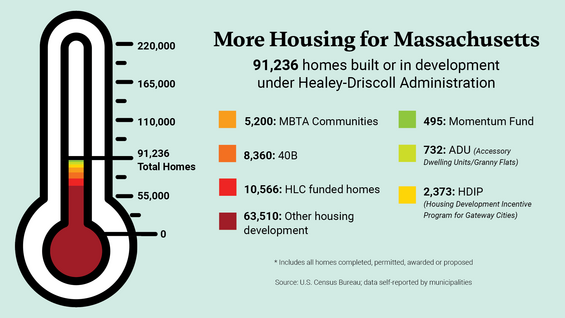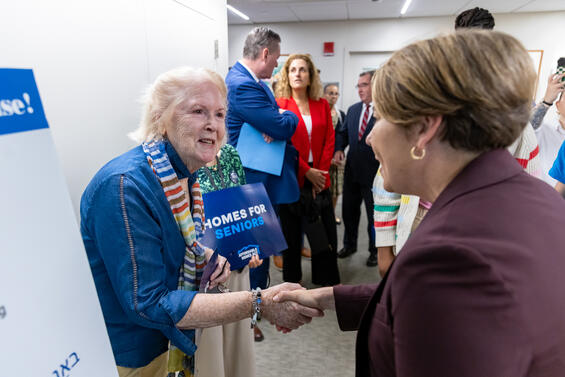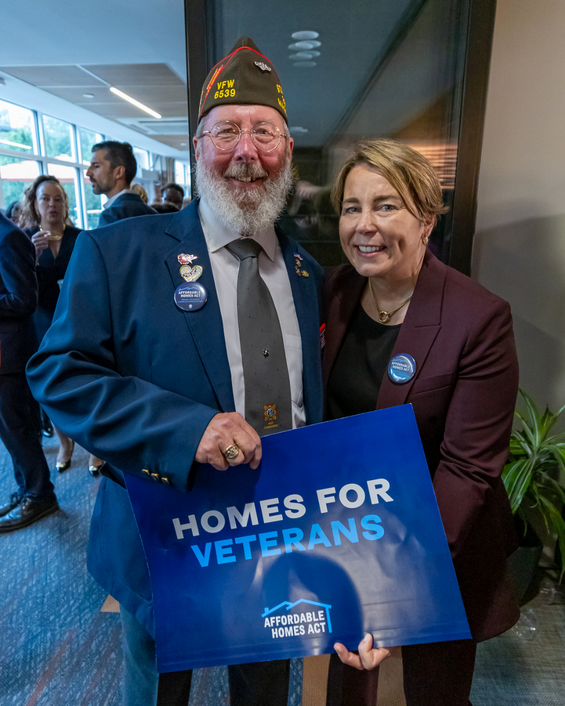
A bold solution
On Aug. 6, 2024 Governor Maura Healey signed the Affordable Homes Act into law. The historic legislation authorizes $5.16 billion in spending over the next five years along with nearly 50 policy initiatives to counter rising housing costs caused by high demand and limited supply.
The bill includes unprecedented authorizations in modernizing the state’s public housing system, boosts programs that support first-time homebuyers and homeownership, and resources to build more housing for low to moderate-income residents. It also includes many policy changes that will unlock housing production in our state, such as allowing accessory dwelling units, support for the conversion of vacant commercial space to housing and support for sustainable and green housing initiatives.
Gov. Healey believes Massachusetts can build more homes and build them faster, and the Affordable Homes Act, filed in October 2023, is how we will accomplish our mission.
The Executive Office of Housing and Livable Communities is now working on the implementation of the Affordable Homes Act. More information will be released in the coming weeks and months regarding key policy initiatives. To receive email updates, please sign up here.
Resources:
Press Release:

Gov. Maura Healey announces the Affordable Homes Act in Chelsea on Oct. 18, 2023.
““The Affordable Homes Act creates homes for every kind of household, at every stage of life, and unlocks the potential in our neighborhoods. Today we are taking an unprecedented step forward in building a stronger Massachusetts where everyone can afford to live.”
- Governor Healey”
Massachusetts: Investing in our communities
Housing in Massachusetts has become too expensive. For decades, the production of new homes hasn’t kept pace with demand. The ripple effects are everywhere. Young people unable to afford that first apartment are living at home longer. Families and individuals trying to buy their first home are looking elsewhere. Older residents looking to find affordable housing are on waitlists. And those who were just getting by paying their rent or mortgage are finding themselves homeless.
The housing crisis threatens what makes Massachusetts great. This comprehensive package of spending and policy actions will strike the root causes of housing unaffordability and has something for everyone across the state.

Restoring Dignity to Public Housing:
- $2 billion in new capital authorization to make capital improvements across the over 43,000 units of state-aided public housing, including $150 million dedicated to the decarbonization of public housing and $15 million for accessibility upgrades.
- $200 million in new capital authorization for the Public Housing Demonstration Program to encourage housing authorities to pursue innovative, market-driven strategies and leverage private resources in order to maintain, preserve and create public housing.

Driving Housing Production & Preservation:
- $800 million in new capital authorization for the Affordable Housing Trust Fund to support the development of affordable housing.
- $275 million in new capital authorization for sustainable and green housing initiatives
- Accelerate innovation housing strategies, including office conversions, modular homes, and a new social housing demonstration program;
- Support the development of transit-oriented housing; and
- Support the creation and rehabilitation of sustainable and climate resilient affordable multifamily housing.
- $50 million in new capital authorization for the Momentum Fund, seeded with $10 million in the Capital Investment Plan, the Momentum Fund will leverage private investment and jumpstart housing production of mixed-income multifamily housing.

Supporting Vulnerable Populations:
- $200 million in new capital authorization for the Housing Innovations Trust Fund to support innovative and alternative forms of rental housing for residents who need extensive support services.
- $70 million in new capital authorization for the Facilities Consolidation Fund to create community-based housing in rental developments for clients of the Departments of Developmental Services and Mental Health.
- $60 million in new capital authorization for the Home Modification Loan program to provide loans to make access and safety modifications to the homes of persons with disabilities and seniors, and prioritize, when possible, projects that comply with decarbonization and sustainability standards.

Building Middle-Income and Homeownership:
- $100 million in new capital authorization to support the creation of affordable homeownership units through the CommonWealth Builder program.
- $100 million in new capital authorization to support the creation of mixed-income rental housing that is affordable for households whose incomes are too high for traditional subsidized housing but are priced out by market rents.
- $50 million, included within the Affordable Housing Trust Fund authorization to support first-time homebuyers through the MassDREAMS program.

Meeting the need of our residents:
- Allows for accessory dwelling units to be built by-right in single family zoning districts in all communities.
- Creates a Commercial Property Conversion Program to support the conversion of commercial properties into housing or mixed-use developments.
- Establishes a process for tenants to petition a court to seal certain eviction records and prohibits consumer reporting agencies from disclosing sealed records.
- Establishes an Office of Fair Housing to support and coordinate enforcement initiatives, fair housing testing and outreach/education.
- Creates a Seasonal Communities designation and establishes an advisory council to assist in the development of programs & resources targeting these communities.
- Establishes a Supportive Housing Pool Fund to provide critical assistance for supportive housing by funding staffing, management, service coordination and other tenancy-related services not funded through other sources.

Chrystal Kornegay, CEO, MassHousing
“This is an historic bond bill, and we congratulate the Governor and Lieutenant Governor, their team, and the Legislature for working together to make the Affordable Homes Act a reality. This legislation will accelerate new mixed-income housing production, help more Massachusetts families achieve homeownership, and bring substantial clean energy improvements to the residents of affordable housing communities. MassHousing looks forward to acting as a partner in the bill’s implementation.”

Roger Herzog, Executive Director, Community Economic Development Assistance Corporation (CEDAC)
“The Affordable Homes Act is impactful legislation that meets this historic moment of need head-on. Governor Healey, Lt. Governor Driscoll, Secretary Augustus and team created a bold package that will now significantly increase opportunities to finance, produce and revitalize much-needed affordable housing – especially for low-income households across Massachusetts. CEDAC is eager and ready to play an important role in this comprehensive approach through the bond programs it manages for the production and renovation of supportive housing and childcare facilities. CEDAC is also excited about the Supportive Housing Pool Fund established as part of the legislation, which will support production and operation of permanent supportive rental housing for a wide range of individuals and families. In addition to the capital authorizations for housing programs, its many and exciting provisions include new zoning and funding resources, and a renewed focus on equity issues through the creation of an Office for Fair Housing. I applaud the Massachusetts Legislature for their swift passage of this critical piece of legislation.”

Clark Ziegler, Executive Director, Massachusetts Housing Partnership
“The Affordable Homes Act is a major step forward for the Commonwealth. It includes an unprecedented state financial commitment to affordable housing coupled with bold policy reforms that will unlock housing production and help put a lid on rising housing costs. A bill of this magnitude was only possible because the Governor and House and Senate leadership came together to confront the state’s housing crisis. They recognized that the Commonwealth’s future depends on our ability to ensure housing opportunity for all our residents. There’s always more to be done and Governor Healey has laid the groundwork for even further progress in the next legislative session.”